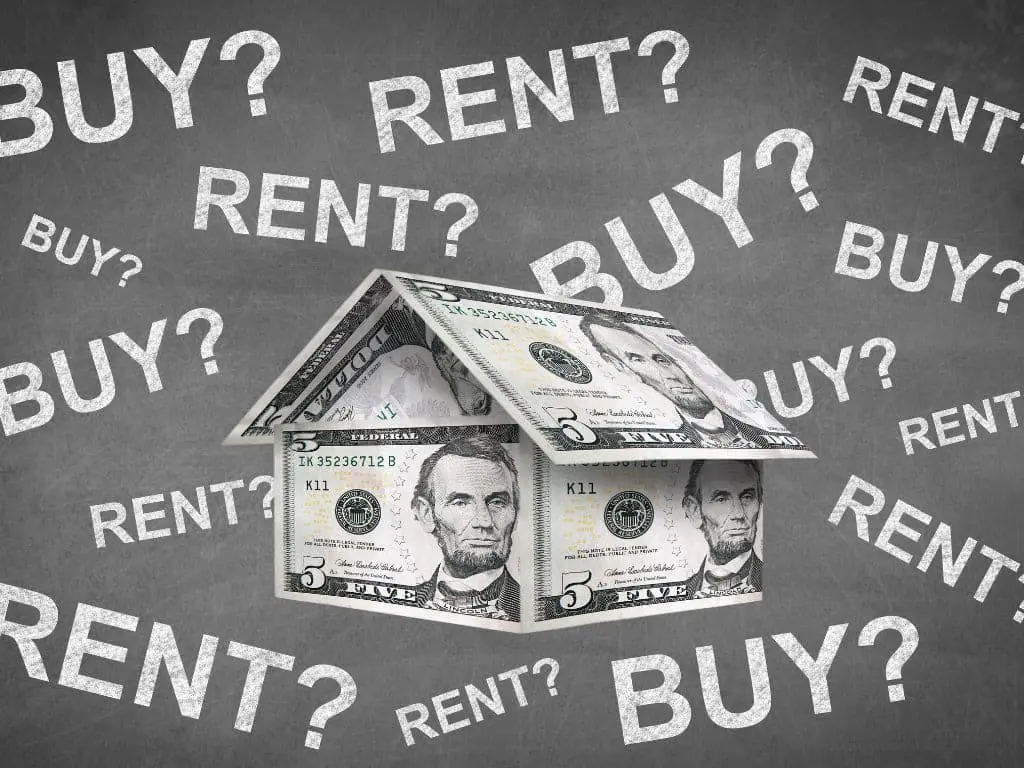Renting vs Buying for Seniors: Is It Cheaper to Rent or Buy?
Choosing between renting or buying a home can be an overwhelming decision for seniors who want financial security in their golden years. Studies show that whether it’s cheaper to rent or buy depends largely on the individual’s circumstances and location.
Renting can be more affordable in the short term, as it eliminates costs like mortgage payments and property taxes. However, buying a home can provide long-term financial benefits, such as building equity and potential appreciation.
Ultimately, seniors should carefully consider their financial situation and weigh the costs and benefits before making a decision that suits their needs best.
This article aims to help navigate this complex issue by analyzing the costs, benefits, and drawbacks of both options specifically for seniors.

Pros and Cons of Renting vs. Buying for Seniors
Renting a home has its ups and downs for seniors. Some good parts of renting are no need to worry about repairs or upkeep costs. You can also move easily if you want to change places.
But there’s a downside too. Rent may go up year after year, and changes in the landlord’s plans could force you to move.
Owning a home as a senior also has highs and lows. The good side is that owning can be an investment. It might gain money over time, giving you extra funds when sold off later on. But keep in mind the flip side – owning leads to expenses like tax bills and repair costs which renters don’t have to bear.
Here is a table comparing renting vs buying a home for seniors:
| Renting | Buying | |
|---|---|---|
| Cost | Lower monthly costs than buying in most cases | Higher monthly costs than renting in most cases |
| Responsibility | Landlord responsible for maintenance and repairs | Homeowner responsible for all maintenance and repairs |
| Flexibility | Easy to move if needed | More difficult to move quickly |
| Equity | No equity built | Build equity over time through mortgage paydown and potential appreciation |
| Taxes | No property taxes | Must pay property taxes |
| Insurance | Just need renters insurance | Must have homeowners insurance |
| Amenities | Access to amenities depends on rental property | Freedom to renovate and customize home |
| Security | Risk of lease non-renewal or rent increases | More housing stability and security |
What Are the Advantages of Renting for Seniors?
Renting has perks for seniors.
- Rent gives a lot of freedom to move around.
- It helps to keep money in the bank instead of a costly house loan.
- Monthly costs are easy to guess since they pay rent and bills.
- Rent may cost less than buying a home, especially in places where houses are pricey.
- There’s no need to fret about fixing things or keeping up the house.
What Are the Disadvantages of Renting for Seniors?
Renting a home can have some downsides for seniors. Here are some of the main problems:
- Seniors who rent do not get the chance to build equity or see a return on their investment, because they do not own the property.
- If a senior is renting and rents go up each year, it could cause money problems.
- Renters have less control over their house than homeowners. Landlords can decide to sell or stop renting out their property any time.
- A landlord’s rules may limit what renters can do with the home.
- Seniors might feel less stable in a rental house because they could be asked to move out when least expected.
- If seniors rent in areas where houses cost a lot, they might spend more money than if they bought a place.
- Renting does not always mean fewer costs as seniors still need to pay for things like renters’ insurance and utilities.
What Are the Benefits of Buying a Home for Seniors?
Buying a home can offer several benefits for seniors:
- Stability: Owning a home provides a sense of stability and security, knowing that you have a place to call your own.
- Equity: As you make mortgage payments, you build equity in your home, which can be a valuable asset for retirement.
- Potential for Appreciation: Real estate has the potential to appreciate over time, meaning that your home could increase in value and provide a return on investment if you decide to sell in the future.
- Customization: When you own your home, you have the freedom to customize and personalize it according to your preferences and needs.
- Pride of Ownership: Owning a home can give you a sense of pride and accomplishment, knowing that you have achieved homeownership.
- Freedom to Age in Place: By purchasing a home that is suitable for aging in place, you can ensure that your living environment meets your changing needs as you get older.
- Control Over Living Space: When you own your home, you have control over how you use the living space, allowing you to create a comfortable and functional environment that suits your lifestyle.
- Potential Rental Income: If you have extra space or decide to downsize later on, owning a home gives you the option to generate rental income by renting out part or all of the property.
What Are the Drawbacks of Buying a Home for Seniors?
Buying a home has some drawbacks for seniors:
- Expenses: Owning a home can be costly, with expenses like mortgage payments, property taxes, homeowners insurance, and maintenance and repairs.
- Financial Risk: The value of a home can fluctuate, which means seniors may not gain as much return on their investment as they had hoped.
- Lack of Flexibility: Buying a home commits seniors to a specific location, making it harder to move if they want or need to be closer to family or healthcare facilities.
- Increased Responsibilities: Homeowners are responsible for taking care of maintenance and repairs themselves, which can be physically challenging for some seniors.
- Limited Access to Amenities: Depending on the location, seniors who buy a home may have limited access to amenities such as community centers or transportation services.
- Selling a house, buying a cheaper one, and investing the equity can create a new income stream for retirees.
- Renting may be cheaper for seniors looking for senior living apartments based on income.
Should Seniors Rent or Buy a Condo?
When it comes to deciding whether seniors should rent or buy a condo, there are some important factors to consider. Renting can be a good option for retirees who want more flexibility and don’t want the responsibilities of homeownership.
It can also be financially beneficial, as rental costs may be lower than mortgage payments and maintenance expenses. On the other hand, buying a condo can provide seniors with stability and the opportunity to build equity over time.
Ultimately, the decision depends on individual circumstances, financial situation, and personal preferences.
Pros and Cons of Renting vs Owning in Retirement
Renting and owning a home both have their pros and cons for seniors in retirement. Let’s look at the advantages of renting first. When you rent, you don’t have to worry about costly repairs or maintenance.
This can save you money and time. Renting also provides flexibility if your needs change or if you want to try living in a different area.
On the other hand, owning a home has its benefits too. For some retirees, homeownership can be cheaper than renting, especially if property taxes are manageable. Owning a home also allows you to build equity over time and possibly earn appreciation on your investment.
However, there are drawbacks to consider as well. Homeownership comes with responsibilities like paying for repairs and property taxes, which can add up over time. Renters don’t have these expenses since they’re taken care of by the landlord.
Ultimately, deciding whether to rent or buy in retirement depends on your personal preferences and financial situation. It’s important to weigh the pros and cons carefully before making a decision that suits your needs best.
Reasons to Rent in Retirement
Renting in retirement can be a good choice for seniors. Here are some reasons why:
- Financial Flexibility: Renting can often be cheaper than buying a home, especially when considering factors like mortgage payments, property taxes, and maintenance costs.
- No Long-Term Commitment: Renting provides flexibility to move whenever desired without the hassle of selling a property or worrying about market conditions.
- Less Maintenance Responsibilities: As a renter, you won’t have to worry about costly repairs or regular maintenance tasks like landscaping and snow removal.
- Access to Amenities: Many rental properties offer amenities such as gyms, pools, and community spaces that can enhance your retirement lifestyle.
- Location Options: Renting allows seniors to choose a location that suits their needs and preferences without being tied down to a specific area.
- More Time for Enjoyment: By renting, you can avoid spending valuable retirement time on home maintenance tasks and instead focus on doing things you love.
Reasons to Buy in Retirement
- Owning a home can provide a sense of stability and security in retirement.
- Buying a home allows retirees to have more control over their living space and make modifications as needed.
- Homeownership can offer the opportunity to build equity and potentially generate wealth through property appreciation.
- Retirees who own their homes may have more options for borrowing against their property, such as obtaining a reverse mortgage if needed.
- Buying a home can provide a sense of pride and accomplishment, as it is an important milestone for many people.
- Homeowners have the freedom to personalize their living environment and create a space that reflects their tastes and preferences.
- Owning a home can provide peace of mind, knowing that there is no risk of eviction or sudden changes in rental terms.
Factors to Consider in Renting vs. Buying
When deciding between renting and buying a home in retirement, there are several important factors to consider. Firstly, think about your financial situation. Renting can be cheaper than owning a home because you don’t have to worry about mortgage payments, property taxes, and repairs.
On the other hand, buying a home may provide stability and the chance to build equity over time.
Next, consider your lifestyle. Renting offers flexibility as you can easily move if your needs change or if you want to explore new areas. Buying a home means committing to one location and taking on responsibilities like maintenance and repairs.
Your health and mobility should also be taken into account. If you anticipate needing assisted living or healthcare services in the near future, renting might be more suitable as it allows for easier transitions between different types of housing options.
Ultimately, the decision between renting and buying depends on your personal preferences and circumstances. It’s important to weigh the financial implications along with factors like lifestyle, health needs, and long-term plans before making a decision that suits you best.
How Do Financial Considerations Impact the Decision to Rent or Buy?
Financial considerations play a crucial role in deciding whether to rent or buy a home. For seniors, it’s important to carefully evaluate their budget and financial situation. Renting can be more affordable for those on a fixed income as there are no upfront costs like down payment or closing costs.
Additionally, renting eliminates the responsibility of property taxes, homeowners insurance, and expensive maintenance and repairs. On the other hand, buying a home may offer long-term financial benefits such as building equity and potential appreciation over time.
Considering factors like tenure and individual circumstances is necessary when making this decision.
How Does Lifestyle Affect the Choice Between Renting and Buying?
Your lifestyle plays a big role in deciding whether to rent or buy a home. If you value flexibility and don’t want the responsibility of maintaining a property, renting may be the better option for you.
Renting allows you to easily move if your needs or preferences change. On the other hand, if you prefer stability and want to put down roots, buying a home might be more suitable. Owning a home gives you control over your living space and allows for personalization.
Consider how your lifestyle, such as travel plans or future caregiving needs, will impact your decision between renting and buying.
Keep in mind that renting doesn’t build equity like homeownership does. However, it also means that you won’t have to worry about property taxes and maintenance costs. Buying a home can be seen as an investment opportunity with potential appreciation and tax benefits but comes with added responsibilities like repairs and ongoing expenses.
How Does Health and Mobility Factor Into Housing Decisions?
The state of our health and mobility plays a big role in deciding where we live, especially as seniors. For example, if we have difficulty with stairs or getting around, it may be important to find housing that is on one level or has accessibility features like ramps or grab bars.
Additionally, living in a neighborhood with amenities like parks and sidewalks can support an active lifestyle and help maintain good health. It’s crucial to consider these factors when making housing decisions because the right home can positively impact our wellbeing and make daily activities easier to manage.
Costs Comparison: Renting vs. Buying
When it comes to housing in your golden years, you need to weigh the costs involved in both renting and buying. Here’s a comparison of the two:
| Cost of Renting | Cost of Buying | |
| Average Cost | This varies across locations but is generally lower than the cost of home ownership. | This depends on the location, type of property and market conditions, but it’s generally higher than renting. |
| Mortgage | Not applicable. | Although mortgage payments can be high, they generally decrease over time and eventually stop once the loan is paid off. |
| Down Payment | Generally, renters are required to pay a security deposit that’s often refundable at the end of the lease. | Buyers typically need to make a down payment which can be significant, especially in expensive housing markets. |
| Closing Costs | Not applicable. | Buyers are responsible for various closing costs including appraisal and inspection fees, title insurance, and loan origination fees. |
| Property Taxes | Not applicable. Property taxes are typically included in the rent. | Property owners must pay annual property taxes which can be significant depending on the location and value of the property. |
| Homeowners Insurance | Renters will need to carry renters insurance, which is often less expensive than homeowners insurance. | Homeowners are required to carry homeowners insurance which covers the structure of the home and personal belongings inside. |
| Maintenance and Repairs | Renters typically are not responsible for maintenance and repairs. The landlord bears these costs. | Homeowners are responsible for all maintenance and repairs, including major expenses like a new roof or HVAC system. |
Each option comes with its own financial considerations. While owning a home might seem more expensive upfront, it could be cheaper in the long run. On the other hand, renting might be more cost-effective in the short term but might not offer the same long-term financial benefits. Every situation is unique, so weigh your options carefully.
What Is the Average Cost of Renting vs. Buying in Various Areas?
According to a report from Trulia, it was found that renting can be less expensive than owning in many areas. The average national cost of a mortgage payment is approximately $1,030, while the cost of renting averages around $1,500. However, when considering the additional costs of homeownership such as closing costs, property taxes, and maintenance, owning a home can be significantly more expensive.
| Location | Average Cost of Renting | Average Cost of Buying |
| Los Angeles, CA | $2,500 | $3,100 |
| New York, NY | $3,000 | $2,600 |
| Chicago, IL | $1,700 | $1,500 |
| Orlando, FL | $1,300 | $1,200 |
| Denver, CO | $1,500 | $1,600 |
Remember that these averages can vary greatly depending on the exact location and size of the home or apartment you are looking to buy or rent. Ultimately, it’s crucial to consider all costs and factors before making a decision.
In comparing the costs of renting versus buying a home, it’s important to consider expenses such as mortgage payments, down payment, closing costs, property taxes, homeowners insurance, maintenance, and repairs.
These costs can greatly impact your financial situation. Renting offers the advantage of not having to worry about upfront costs like a down payment or closing costs. Additionally, renters are not responsible for property taxes or homeowners insurance.
Maintenance and repairs are also taken care of by the landlord in most cases. On the other hand, when buying a home, you will need to make a down payment and pay for closing costs which can range from 3.5% to 20% of the sale price.
Best Places to Retire if You Decide to Buy
If you decide to buy a home for your retirement, there are some great places to consider. One popular option is Florida, with its warm weather and lower taxes. It’s also home to many active adult communities specifically designed for retirees.
Another top choice is Arizona, known for its beautiful desert landscapes and affordable housing options. Texas is another state worth considering due to its low cost of living and lack of income tax.
Colorado is a great place for outdoor enthusiasts, with its stunning mountains and opportunities for hiking, skiing, and other activities. North Carolina offers a mix of natural beauty and vibrant cities like Asheville and Charlotte.
Lastly, Tennessee has become increasingly popular among retirees because of its low cost of living, friendly communities, and no state income tax.
When deciding on the best place to retire if you decide to buy a home as a senior, it’s important to consider factors such as climate preferences, access to healthcare facilities, proximity to family or friends, cost of living,
and recreational activities available in the area. Ultimately, the best place will depend on your individual needs and desires for your retirement years.
Housing Options Available to Seniors
If you’re a senior and looking for housing options, here are some choices available to you:
- Rental Properties: You can choose to rent an apartment or a house. Renting gives you the flexibility to move if needed.
- Buying a Home: If you prefer to own your home, you can buy a house or a condo. Owning a home can give you stability and the opportunity to build equity.
- Assisted Living: Assisted living facilities provide support and assistance with daily activities for seniors who may need some help.
- Independent Living Communities: These communities are designed for active seniors who want to live independently but also have access to amenities and social activities.
- Memory Care Facilities: For those with memory loss or Alzheimer’s disease, memory care facilities offer specialized care and support.
- Nursing Homes: Nursing homes provide 24-hour medical care for seniors who require constant supervision and assistance.
What Types of Rental Properties Are Available to Seniors?
There are different types of rental properties available for seniors. Here are some options to consider:
- Senior Living Apartments: These are apartments specifically designed for seniors. They often have amenities like elevators, grab bars, and emergency call systems to cater to their needs.
- Senior Cottages: These are small houses or cottages that offer independent living for seniors. They provide privacy and a sense of community within a retirement village or community.
- Independent Living Communities: These communities offer a variety of housing options for seniors, including apartments, townhouses, and single-family homes. They often come with amenities like fitness centers, social activities, and on-site healthcare services.
- Assisted Living Facilities: These facilities provide housing for seniors who need help with daily activities like bathing, dressing, and medication management. They offer personalized care services in a supportive environment.
- Memory Care Communities: Memory care communities cater specifically to seniors with Alzheimer’s or other forms of dementia. They provide specialized care and support in a secure setting.
What Types of Homes Can Seniors Buy?
Seniors have various options when it comes to buying a home after retirement. Here are some types of homes that seniors can consider:
- Single-family homes: These are standalone houses that offer privacy and space for seniors who prefer a more independent lifestyle.
- Condos: Condominiums are a popular choice among seniors due to their low maintenance requirements and shared amenities like swimming pools or fitness centers.
- Townhouses: Similar to single-family homes, townhouses offer more privacy compared to condos while still providing the convenience of shared maintenance services.
- Retirement communities: These communities are designed specifically for seniors and often include recreational facilities, social activities, and on-site healthcare options.
- Manufactured or mobile homes: These homes are typically more affordable and offer flexibility in terms of location, but they may come with restrictions on where they can be placed.
How Do Assisted Living, Independent Living, Memory Care, and Nursing Homes Fit Into These Options?
Assisted living, independent living, memory care, and nursing homes are different housing options for seniors.
- Assisted living: This is a facility where seniors can live independently but receive assistance with daily activities like bathing, medication management, and meal preparation.
- Independent living: This option is ideal for active seniors who want to live in a community with other seniors. They have their own apartments or cottages and can participate in social activities.
- Memory care: These facilities provide specialized care for seniors with Alzheimer’s disease or other forms of dementia. Staff members are trained to handle the unique needs of residents with memory impairments.
- Nursing homes: Also known as skilled nursing facilities, these provide 24-hour medical care for seniors who need more intensive assistance and supervision.
Financial Implications of Renting vs. Buying
Renting a home can have different financial implications compared to buying one, especially for seniors. For retirees who are on a tight budget, renting may be more affordable than owning a house with a costly mortgage.
This is particularly true in areas where housing prices are high, like the coasts. Financial experts often recommend renting for seniors who cannot afford the expenses associated with homeownership.
On the other hand, owning a home can also have its financial benefits, especially in retirement. While there are upfront costs such as down payments and closing fees, homeownership can be cheaper in the long run.
Homeowners have the potential to build equity and benefit from property appreciation over time.
However, it’s important to note that some retirees may not have a choice but to rent due to their financial circumstances. Renting allows them to find more affordable housing options without having the burden of maintenance and repairs.
Ultimately, when deciding between renting or buying, seniors should carefully consider their personal financial situation and weigh all the costs involved before making a decision that best suits their needs and budgets.
How Can Owning a Home Impact a Senior’s Financial Situation?
Owning a home can impact a senior’s financial situation in several ways. First, owning a home can provide stability and security, as it removes the uncertainty of rising rental costs or the possibility of having to move frequently.
Second, homeownership allows seniors to build equity over time, which can serve as an asset or inheritance for their loved ones. Additionally, owning a home may offer potential tax benefits through deductions for mortgage interest and property taxes.
Lastly, if the value of the home appreciates over time, seniors can potentially sell their house at a profit and use that money for retirement expenses or other financial needs. However, it is important to consider ongoing costs such as maintenance, repairs, property taxes, and homeowners insurance when budgeting for homeownership in retirement.
How Can Renting Affect a Senior’s Finances?
Renting a home can have both positive and negative effects on a senior’s finances. On the positive side, renting can be cheaper for seniors, especially if they are looking for senior living apartments based on their income.
Renting eliminates the costs of a down payment, mortgage payments, property taxes, and homeowners insurance. This can free up more money in their budget for other essential expenses or leisure activities.
Additionally, renting often includes maintenance and repairs, reducing the financial burden on seniors.
However, it’s important to consider the potential drawbacks of renting as well. Unlike owning a home where equity can build over time through appreciation, rental payments do not contribute to any long-term gains or investments.
Seniors who rent may not have access to certain tax benefits that come with homeownership either. Moreover, monthly rent amounts are subject to change at the landlord’s discretion or due to market conditions.
Legal and Logistical Considerations
Seniors considering renting or buying a home should be aware of the legal and logistical considerations involved. As a tenant, you have certain rights, such as the right to safe and habitable housing, privacy, and protection against discrimination.
It’s important to understand your lease agreement and know what responsibilities you have as a tenant, such as paying rent on time and taking care of the property. On the other hand, if you decide to buy a home, there are legal obligations as well.
You’ll need to familiarize yourself with local zoning laws, homeowner association rules (if applicable), and ensure that all necessary paperwork is in order. It’s also essential to consider factors like property taxes and homeowners insurance when budgeting for homeownership.
Seeking advice from legal professionals can help clarify any questions or concerns regarding these matters.
What Legal Rights and Responsibilities Do Tenants Have?
Tenants have legal rights and responsibilities when renting a home. These laws protect them and ensure fair treatment. Here are some important things to know:
- Tenants have the right to a safe and habitable living space.
- They have the right to privacy in their rented home.
- Tenants cannot be discriminated against based on race, gender, religion, or disability.
- Landlords must maintain the property and make necessary repairs.
- Tenants have the right to request repairs from their landlord.
- They have the responsibility to pay rent on time according to the lease agreement.
- Tenants must take care of the property and keep it clean.
- They should adhere to any rules outlined in the lease agreement.
- If there are issues with the landlord, tenants can seek assistance from local tenant associations or authorities.
- In some cases, tenants may be able to withhold rent or terminate the lease if necessary repairs are not addressed.
What Legal Obligations Do Homeowners Have?
Homeowners have important legal obligations when they own a home. It’s essential for seniors to understand these responsibilities before buying a property. Here are the key legal obligations that homeowners have:
- Regular Maintenance: Homeowners are responsible for maintaining their property, including repairs, renovations, and general upkeep.
- Equipment Failures: If any equipment in the home, such as water heaters or air conditioning units, fails, it is the homeowner’s responsibility to fix or replace them.
- Catastrophes: In the event of natural disasters or accidents like flooding or fire, homeowners are responsible for dealing with insurance claims and repairs.
- Property Taxes: Homeowners must pay property taxes to their local government based on the value of their property.
- Homeowners Association (HOA) Rules: If the home is part of an HOA, homeowners must follow the rules and regulations set by the association.
- Zoning and Building Regulations: Homeowners need to comply with local zoning laws and building regulations when making changes to their property.
- Liability Issues: Homeowners can be held liable if someone gets injured on their property due to negligence or unsafe conditions.
- Insurance Requirements: Mortgage lenders often require homeowners to have insurance coverage for their property.
- Local Laws and Regulations: Homeowners must adhere to any other relevant local laws and regulations related to homeownership.
Conclusion
Deciding whether to rent or buy a home in retirement depends on your specific situation. Renting can be a good option for seniors who are relocating or have limited financial resources.
It allows them to free up home equity and avoid the costs of homeownership. On the other hand, buying a home may be cheaper if property taxes are manageable and can provide stability and potential appreciation over time.
Ultimately, it’s important to consider factors like finances, lifestyle, and health when making this decision.
FAQs
1. What is downsizing for seniors?
Downsizing is when seniors move to a smaller space, from a larger home that they might own to something more manageable.
2. Are there benefits for seniors when renting instead of buying?
Renting can be cheaper and easier than buying. Landlords have responsibilities like repairs, freeing up time for the tenant.
3. When it comes to renting or buying, which one provides more rights for a senior citizen?
Both tenants and homeowners have rights; however, tenant rights can often provide added protection on matters such as rent hikes or eviction.
4. How does tenant screening impact seniors?
Tenant screening helps landlords understand who will live in their property. For seniors, this could affect both rent costs and the availability of homes.






